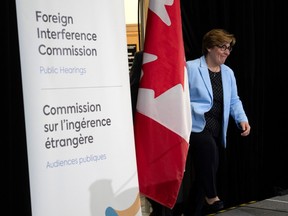OTTAWA – The federal agency that investigates election infractions found insufficient evidence to support suggestions Beijing wielded undue influence against the Conservatives in the Vancouver area during the 2021 general election.
The Commissioner of Canada Elections’ recently completed review of the lingering issue was tabled Tuesday at a federal inquiry into foreign interference.
The review focused on the unsuccessful campaign of Conservative candidate Kenny Chiu in the riding of Steveston-Richmond East and the party’s larger efforts in the Vancouver area.
It says the evidence uncovered did not trigger the threshold to initiate a formal investigation under the Canada Elections Act.
Investigators therefore recommended that the review be concluded.
A summary of the review results was shared with the Canadian Security Intelligence Service and the RCMP. The review says both agencies indicated the election commissioner’s findings were consistent with their own understanding of the situation.
During the exercise, the commissioner’s investigators met with Chinese Canadian residents of Chiu’s riding and surrounding ones.
They were told of an extensive network of Chinese Canadian associations, businesses and media organizations that offers the diaspora a lifestyle that mirrors that of China in many ways.
“Further, this diaspora has continuing and extensive commercial, social and familial relations with China,” the review says.
Some interviewees reported that this “has created aspects of a parallel society involving many Chinese Canadians in the Lower Mainland area, which includes concerted support, direction and control by individuals from or involved with China’s Vancouver consulate and the United Front Work Department (UFWD) in China.”
Investigators were also made aware of members of three Chinese Canadian associations, as well as others, who were alleged to have used their positions to influence the choice of Chinese Canadian voters during the 2021 election in a direction favourable to the interests of Beijing, the review says.
These efforts were sparked by elements of the Conservative party’s election platform and by actions and statements by Chiu “that were leveraged to bolster claims that both the platform and Chiu were anti-China and were encouraging anti-Chinese discrimination and racism.”
These messages were amplified through repetition in social media, chat groups and posts, as well as in Chinese in online, print and radio media throughout the Vancouver area.
Upon examination, the messages “were found to not be in contravention” of the Canada Elections Act, says the review, citing the Supreme Court of Canada’s position that the concept of uninhibited speech permeates all truly democratic societies and institutions.
The review says the effectiveness of the anti-Conservative, anti-Chiu campaigns was enhanced by circumstances “unique to the Chinese diaspora and the assertive nature of Chinese government interests.”
It notes the election was prefaced by statements from China’s ambassador to Canada and the Vancouver consul general as well as articles published or broadcast in Beijing-controlled Chinese Canadian media entities.
“According to Chinese Canadian interview subjects, this invoked a widespread fear amongst electors, described as a fear of retributive measures from Chinese authorities should a (Conservative) government be elected.”
This included the possibility that Chinese authorities could interfere with travel to and from China, as well as measures being taken against family members or business interests in China, the review says.
“Several Chinese Canadian interview subjects were of the view that Chinese authorities could exercise such retributive measures, and that this fear was most acute with Chinese Canadian electors from mainland China. One said ‘everybody understands’ the need to only say nice things about China.”
However, no interview subject was willing to name electors who were directly affected by the anti-Tory campaign, nor community leaders who claimed to speak on a voter’s behalf.
Several weeks of public inquiry hearings will focus on the capacity of federal agencies to detect, deter and counter foreign meddling.
In other testimony Tuesday, Conservative MP Garnett Genuis told the inquiry that parliamentarians who were targeted by Chinese hackers could have taken immediate protective steps if they had been informed sooner.
It emerged earlier this year that in 2021 some MPs and senators faced cyberattacks from the hackers because of their involvement with the Inter-Parliamentary Alliance on China, which pushes for accountability from Beijing.
In 2022, U.S. authorities apparently informed the Canadian government of the attacks, and it in turn advised parliamentary IT officials — but not individual MPs.
Genuis, a Canadian co-chair of the inter-parliamentary alliance, told the inquiry Tuesday that it remains mysterious to him why he wasn’t informed about the attacks sooner.
Liberal MP John McKay, also a Canadian co-chair of the alliance, said there should be a clear protocol for advising parliamentarians of cyberthreats.
This report by The Canadian Press was first published Sept. 17, 2024.




































Comments